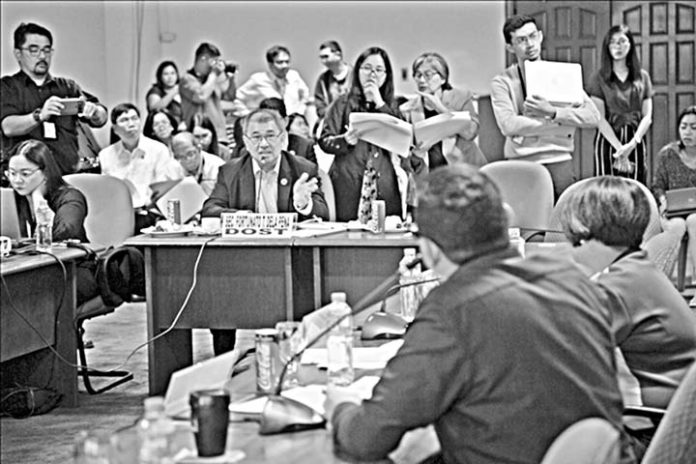Nelson S. Badilla

In Photo: Science Secretary Fortunato T. de la Peña (center) explains some of the provisions of the proposed Balik Scientist Act before Sen. Paulo Benigno A. Aquino IV (second from right, back to the camera) and Sen. Maria Lourdes Nancy S. Binay (right, back to the camera) during the recent Bicameral Conference Committee meeting at Senate of the Philippines in Pasay City.
The Balik Scientist Program of the Department of Science and Technology (DOST) will finally be institutionalized and strengthened in order to encourage the Filipino scientists who have been working in foreign countries to return to the Philippines so they could participate and contribute to the development of the country.
Science Secretary Fortunato T. de la Peña pointed this out after the Philippine Congress’s Bicameral Conference Committee approved the proposed Balik Scientist Act on March 6.
“It is very crucial to strengthen the Balik Scientist Program of the DOST because we have areas that lack experts. Examples are space technology and artificial intelligence, which are just starting. It is very crucial to have enough human resource in these fields to help us in conducting various research and development projects,” de la Peña said in Filipino in a news release.
De la Peña has been supporting the passage of the bill, since he was a DOST undersecretary some years back.
The proposed Balik Scientist Act, also known as Senate Bill 1533, is expected to become a law by April or May once President Duterte signs it.
“Upon transmittal of all the documents to Malacañang, which will take a few weeks, then, in 30 days, if there is no veto message, we expect that he will sign this and it should be a law by April or May. I don’t see any reason for the President [Duterte] not to approve this law. We all know that he would like to see all greatest Filipino minds to stay in the country to contribute to economic development,” said Sen. Paulo Benigno A. Aquino IV, principal author of the bill in the Senate, as quoted in the news release.
Aquino’s counterpart in the House of Representatives is Rep. Erico Aristotle C. Aumentado of the Second District of Bohol.
The Balik Scientist Program was first established in 1975 when then-President Ferdinand E. Marcos issued Presidential Decree 819. Its importance was given attention in 1993 by then-President Fidel V. Ramos when he issued Executive Order 130.
According to the DOST, it would institutionalize the Balik Scientist Program because it will definitely encourage Filipino scientists to return and contribute to research that will help address development gaps in the Philippines.
The proposed law would give more incentives to returning Filipino experts, scientists, inventors and engineers.
One of its salient points is that a returning scientist who will work for DOST’s projects will enjoy various compensations that include tax and duty exemptions to importation of professional equipment and materials, free medical and accident insurance covering the award period, reimbursement of expenses for baggage related to scientific projects and even exemption from “renouncing their oath of allegiance to the country where they took the oath.”
The scientists would also have an opportunity to participate in DOST’s Grants-in-Aid research and development.
The grant may be provided to the scientist and released through the host institution for the implementation of the project in accordance with relevant government regulations and the need of the program involved.
The benefits that the returning scientists will get also incude special working and nonworking visas, a round-trip airfare from a foreign country to the Philippines, exemption from local travel tax and DOST-subsidized visa application.
Another benefit the returning Filipino scientists will enjoy include relocation benefits—such as support in securing job opportunities for the spouse of the awardee and admission support for the children of awardees in preferred schools, relocation allowance and monthly housing or accommodation allowance, and funding for the establishment and development of a facility or laboratory as stipulated in the propose law.
At the same time, the proposed law said a nonbachelor’s degree graduate but with extensive experience in important fields can also be considered a Balik Scientist, therefore, can apply for the program.
On top of that, it will give priority to scientists who have expertise in the fields of space, technology, artificial intelligence, biomedical engineering, energy agriculture and food technology, biotechnology, information and communications technology, pharmaceutical, disaster mitigation and management, environment and natural resources, electronics, genomics, health, manufacturing, nanotechnology, cyber security and semiconductors, as all of these fields are very important to the country, in general.
Aquino said, “Institutionalizing the Balik Scientist Program of DOST is one way of showing that we recognize the importance of our scientists and engineers abroad, especially on how their knowledge, expertise and experience could help a lot in order to address some of the pressing problems of different areas in the country, particularly in the urban part.”
Rep. Joey S. Salceda of the Second District of Albay told the BusinessMirror on March 12 that the Balik-Scientist Act will “encourage Filipino scientists and technologists abroad to come home, share their expertise and help speed up the country’s development in exchange for a package of benefits that is globally competitive.”
Salceda also pointed out that the proposed law would trigger the flow of modern technologies in various fields in the country.




